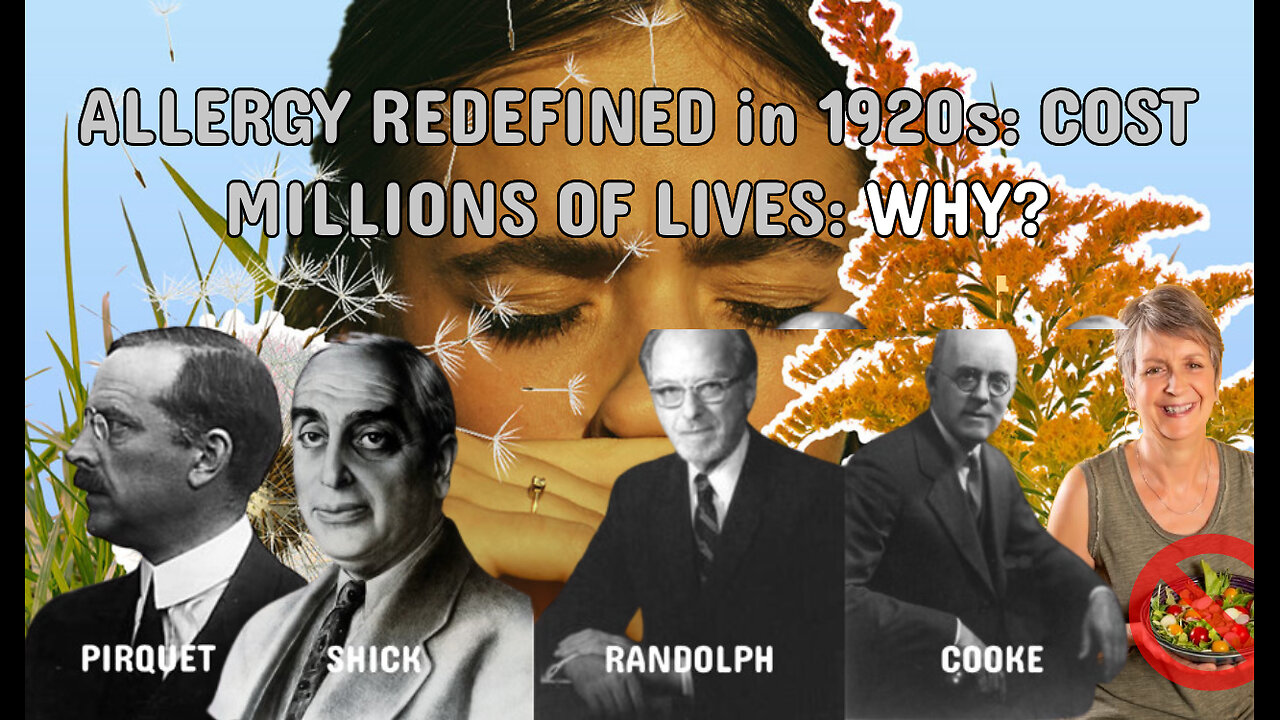Premium Only Content

Why Did 1920s “Allergy” Redefinition Cost 100s Millions Of Lives?
This shift has resulted in many lives lost, as the medical community began to ignore patients' complaints about sensitivities to everyday substances, which could lead to various health problems.
Many individuals do not realize they have allergies, often called 'hidden' or 'silent' allergies. These can be hard to identify because their symptoms are often mild, misunderstood, or occur rarely.
Undetected allergies can cause various symptoms that affect daily life, often without a clear link to a specific allergen. Symptoms may include tiredness, digestive problems, skin issues, breathing difficulties, and even neurological conditions like ADHD or migraines. In some cases, they can lead to severe allergic reactions.
Allergy is an overreaction of the immune system to usually harmless substances, known as allergens. This can lead to skin issues, breathing problems, digestive troubles, or severe reactions like anaphylaxis. In 1925, European allergists changed the definition of allergy, focusing on antibody-antigen interactions and leaving out other types of hypersensitivity.
Reasons for Hidden Allergies include subtle symptoms that may be mistaken for other issues, delayed reactions that appear hours or days after exposure, and misinterpretation of symptoms like digestive problems, tiredness, or skin rashes as other conditions.
Hidden allergens can be found in processed foods, cosmetics, or medications, making them difficult to recognize. Cross-contamination can also occur, where foods that should be allergen-free become contaminated during production or preparation.
Examples of hidden allergens include soy, milk, eggs, or nuts in processed foods, cross-contaminated sandwiches, tree nuts and coconut in skincare products, and less common allergens like lentils or sesame. Not recognizing hidden allergies can lead to chronic health issues, missed diagnoses, and a higher risk of severe allergic reactions.
Source:
-
 18:18
18:18
DeVory Darkins
17 hours ago $16.58 earnedPortland gets NIGHTMARE NEWS as Trump orders Troops to crush violent rioters
18K149 -
 LIVE
LIVE
TonYGaMinG
3 hours ago⚔ Trying out this NEW game called " SWORN " ⚔
485 watching -
 LIVE
LIVE
Lofi Girl
2 years agoSynthwave Radio 🌌 - beats to chill/game to
208 watching -
 29:27
29:27
James Klüg
1 day agoAmericans Remembering Charlie Kirk
13.9K3 -
 9:36:11
9:36:11
GoA_Malgus
9 hours ago $0.13 earnedGoA Malgus - The Legend Has Returned!!! - Live domination on Black Ops 6
6.67K -
 48:15
48:15
SouthernbelleReacts
1 day ago $8.60 earnedWeapons (2025) REACTION | Josh Brolin, Julia Garner, Alden Ehrenreich | Horror-Mystery Thriller
36K21 -
 39:36
39:36
mizery
4 days ago $0.79 earnedI Mastered Fortnite in 30 Days
17.5K6 -
 25:50
25:50
ChopstickTravel
18 days ago $3.69 earned24 Hours With Sri Lanka’s Vedda People!! (Barehand Honey Harvest)
32.1K7 -
 8:13
8:13
Danny Rayes
1 day ago $2.61 earnedMost Hated Teacher on Tiktok
20K20 -
 15:31
15:31
Chris Harden
9 days ago $4.00 earnedWhat Happened to Kewanee, Illinois?
21.1K11